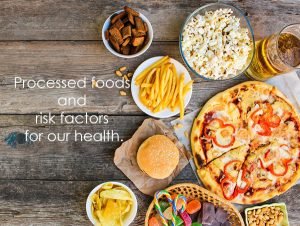Let’s face it, processed foods are everywhere. They’re convenient, often tasty, and can be budget-friendly. But what about the impact of processed foods on our health? With busy schedules and hectic lifestyles, it’s easy to rely on these pre-made options. However, the truth is, that there’s a growing body of evidence that a diet high in processed foods can significantly affect our health in several ways.
In this article, we’ll delve into the latest information about processed foods and their potential health risks. We’ll explore what exactly constitutes processed food, the ingredients to watch out for, and the concerning link between processed food consumption and chronic diseases. We’ll also provide practical tips to help you navigate the grocery aisles and make informed choices for a healthier you.
What Exactly Are Processed Foods

Not all processed foods are created equal. Simply put, some processing methods can actually enhance the nutritional value of certain foods. For example, freezing fruits and vegetables helps lock in nutrients. However, the term “processed food” generally refers to food that has undergone significant changes to its original state. This can involve:
- Milling and refining (e.g., white flour, white rice)
- Canning and bottling
- Freezing
- Fermentation (e.g., yogurt, cheese)
- Adding preservatives, artificial flavors, colors, and sweeteners
The level of processing can vary greatly. But a common concern with heavily processed foods is that they often contain high amounts of:
- Added sugar: This can contribute to weight gain, type 2 diabetes, and heart disease.
- Unhealthy fats: Saturated and trans fats can increase LDL (“bad”) cholesterol and raise the risk of heart disease.
- Sodium: Excessive sodium intake can lead to high blood pressure, a major risk factor for heart disease and stroke.
- Refined carbohydrates: These can cause blood sugar spikes and crashes, leading to increased hunger and cravings.
While these ingredients may enhance taste and shelf life, they often come at the expense of essential nutrients like fiber, vitamins, and minerals.
Processed Foods and the Rise of Chronic Diseases
There’s a growing body of research suggesting a strong link between a diet high in processed foods and an increased risk of chronic diseases. Here’s a closer look at some of the major concerns:
- Obesity and Weight Gain: Processed foods are often calorie-dense and low in fiber, making it easy to overeat. This can contribute to weight gain and obesity, a major risk factor for several chronic diseases. A 2019 study published in the journal, “Nutrients”, found a positive association between ultra-processed food consumption and body weight.
- Type 2 Diabetes: The high sugar and refined carbohydrate content in processed foods can cause blood sugar spikes and disrupt insulin function. This can increase the risk of developing type 2 diabetes. A large review published in the journal, “PLOS Medicine” in 2019, found that higher consumption of ultra-processed foods was associated with an increased risk of type 2 diabetes.
- Heart Disease: Processed foods can be high in unhealthy fats, sodium, and added sugar, all of which are risk factors for heart disease. The leading cause of death globally, heart disease is a complex issue with many contributing factors. However, a 2017 study published in the journal, “Circulation”, suggests a positive association between ultra-processed food intake and cardiovascular mortality.
- Cancer: While the research is ongoing, some studies suggest a link between ultra-processed foods and an increased risk of certain cancers. A 2022 study published in the International Journal of Cancer found an association between ultra-processed food consumption and colorectal cancer. More research is needed to fully understand this connection.
It’s important to note that correlation doesn’t always equal causation. However, the growing body of evidence is concerning and highlights the need to be mindful of our processed food intake.
Why Do We Choose Processed Foods
Despite the potential health risks, processed foods remain popular for several reasons:
- Convenience: They’re often quick and easy to prepare, perfect for busy schedules.
- Affordability: Processed foods can be cheaper than fresh ingredients, especially in certain areas.
- Palatability: Manufacturers often add ingredients like sugar, salt, and unhealthy fats to make processed foods more appealing to our taste buds.
- Marketing: Processed foods are heavily marketed, making them seem like a healthy and delicious choice.
Making a Shift Towards a Healthier You: Practical Tips to Reduce Processed Food Intake
While the convenience of processed foods can be tempting, incorporating more whole foods into your diet is an investment in your long-term health. Here are some practical tips to get you started:
- Plan Your Meals: Taking some time each week to plan your meals can help you avoid impulse purchases of processed foods.
- Stock Up on Whole Foods: Fill your pantry and refrigerator with plenty of fruits, vegetables, whole grains, lean proteins, and healthy fats.
- Embrace Batch Cooking: Dedicate some time each week to cook large batches of healthy meals. Portion them out for quick and easy grab-and-go lunches or dinners throughout the week.
- Get Creative in the Kitchen: Experiment with new recipes using whole ingredients. There are endless possibilities for delicious and healthy meals!
- Befriend the Frozen Food Section: Frozen fruits and vegetables can be a healthy and convenient option. Look for options with no added sugars or sodium.
- Limit Added Sugars: Be mindful of hidden sugars in processed foods like salad dressings, condiments, and yogurt. Opt for unsweetened or low-sugar varieties whenever possible.
- Read Food Labels Like a Pro: Don’t be fooled by marketing claims. Focus on the ingredients list and prioritize foods with a short list of recognizable whole ingredients.
- Make Smart Swaps: There are often healthier alternatives to your favorite processed foods. For example, swap sugary cereals for plain Greek yogurt with berries, or choose air-popped popcorn instead of potato chips.
- Start Small: Don’t try to overhaul your diet overnight. Make gradual changes that you can stick with in the long term.
- Cook More Often: The more comfortable you become in the kitchen, the easier it will be to prepare healthy meals at home.
Remember, change takes time and effort. Be patient with yourself and celebrate your progress along the way!
The Bottom Line: Processed Foods and Your Health
Processed foods can certainly be a part of a balanced diet, but it’s important to be mindful of their potential health risks. By understanding what processed foods are and how they can affect your health, you can make informed choices to create a diet rich in whole foods that nourishes your body and keeps you feeling your best.
Here are some additional thoughts and considerations:
- Focus on Freshness: Whenever possible, choose fresh fruits and vegetables over processed options. Fresh produce provides a wider range of nutrients and fiber.
- Don’t Fear Fat: Healthy fats, such as those found in avocados, nuts, and olive oil, are an essential part of a balanced diet. They can help you feel full and satisfied.
- Drink Plenty of Water: Water is essential for overall health and can help curb cravings for sugary drinks.
- Make Gradual Changes: Trying to overhaul your diet overnight is likely to set you up for failure. Start by making small, sustainable changes that you can stick with.
- Seek Support: Talk to your doctor or a registered dietitian for personalized advice on creating a healthy eating plan that meets your individual needs and preferences.
By making informed choices and prioritizing whole foods, you can create a diet that supports your health and well-being for years to come.
